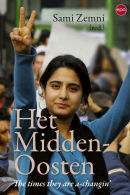(16-05-2013) Baghdad market attacks, shootings in north kill 17
(15-05-2013) How Baghdad Fuels Iraq's Sectarian Fire
(14-05-2013) Iraq's invisible refugee crisis
(03-06-2013) War Crimes as Policy
(11-05-2013) INSIDE IRAQ TODAY
(15-04-2013) Iraq: The Invasion of Our Nation Goes Unpunished
(12-04-2013) Irak: 10 años del American way of death
The BRussells Tribunal is independent and wants to remain independent.
The BRussells Tribunal is an activist think tank and peace organisation with a special focus on Iraq. Read more...



 The times they are a-changin' is het eerste grondige Nederlandstalig overzicht dat voorbij oppervlakkigheden en algemeenheden wandelt, en ook nog eens de hele regio bestrijkt, van Egypte en Tunesië tot Marokko, Libië, Syrië, Libanon, Palestina, Jemen, Jordanië, Irak, Bahrein en Israël. Daar bestaat een woord voor: een standaardwerk.
The times they are a-changin' is het eerste grondige Nederlandstalig overzicht dat voorbij oppervlakkigheden en algemeenheden wandelt, en ook nog eens de hele regio bestrijkt, van Egypte en Tunesië tot Marokko, Libië, Syrië, Libanon, Palestina, Jemen, Jordanië, Irak, Bahrein en Israël. Daar bestaat een woord voor: een standaardwerk.